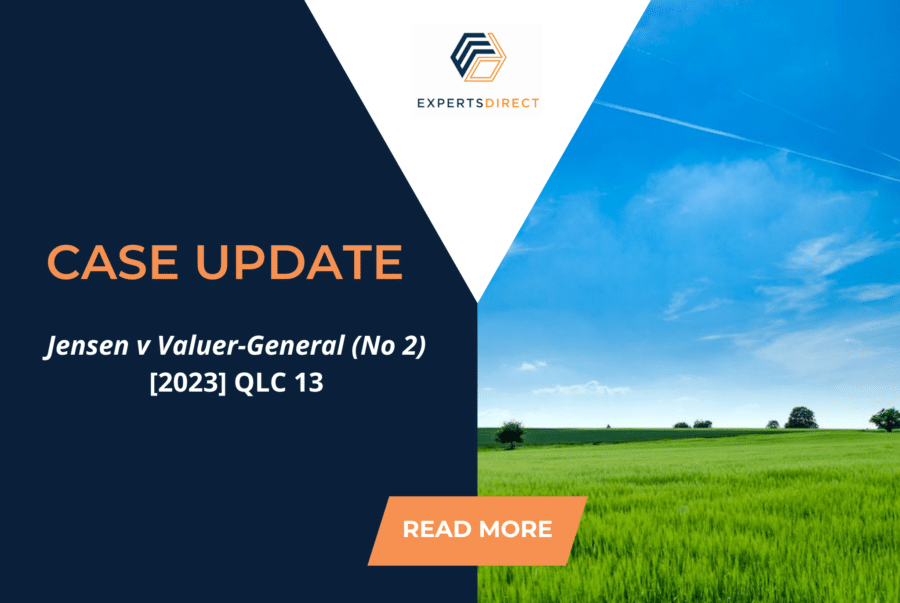Jensen & Anor v Valuer-General (No 2) [2023] QLC 13
In this case, the court considered the issue of independence and bias in the context of an expert who had a pre-existing relationship with the party to the proceedings.
Background
The appellants owned 16.39 ha of land in Queensland (the land). In 2020, the Valuer-General’s valuation of the land was $640,000. The appellants appealed this valuation, arguing that the proper value was $400,000. The appellants took issue with the valuation methodology of the Valuer-General’s expert valuer, Mr M, and submitted that his report exhibited apprehended bias. The appellants did not provide any expert valuation evidence in support of their appeal.
Expert evidence
Mr M was a registered valuer who had been employed by the Valuer-General for almost 40 years. Mr M was the “original valuer” for a mass appraisal valuation undertaken by the Valuer-General in 2020. He later provided a valuation report for the hearing relying on material that pre-dated the objection decision which was the subject of the appeal.
The appellants took issue with the reliability of Mr M’s valuation because:
- of the apparent confusion and conflation of the mass appraisal valuation and the subject valuation; and
- the valuation methodology was unsupported by necessary and relevant documentation and contained a number of errors.
The appellants pointed out factors that Mr M relied upon in forming his opinion, but which were not detailed in his report, such as:
- Mr M produced vegetation management information for the comparable properties on which he relied, but did not annex to his report;
- Mr M produced an agreement to provide a water easement which was not annexed to his report;
- Mr M referred to a certificate of title to explain an easement agreement which was neither produced to the court nor annexed to his report;
- Mr M said that his notes showed that the fencing was in poor condition but he did not annex any notes to his report; and
- Mr M told the court that he had spoken to the vendors, purchasers, or agents involved in the comparable sales, but his report did not refer to any of those conversations, nor did he disclose the content of those conversations or annex copies of any file notes.
Because of these omissions, the court found that Mr M’s report fell short of what is required by the court of an expert report.
The appellants also questioned the independence of Mr M as an expert witness when he was the person who prepared the initial valuation and/or entered the data for the mass appraisal conducted by the Valuer-General in 2020.
The court found that tension may arise when the independent expert evidence is provided by a valuer who is an employee of the party, or has previously supplied advice to the instructing party as part of preparing for litigation. While it is always preferable that the expert be objectively independent, previous involvement with a party to proceedings will not necessarily mean that an expert is not bringing an independent mind to the evidence. [14]
The court found error in Mr M’s statement that the access, services, and outlook for a comparable sale were similar to the subject property when they were, in fact, slightly superior. The court said that these errors should have had some impact on Mr M’s assessment. [49]
The court was mindful that the valuation of $640,000 arrived at through mass appraisal survived a supposedly independent examination, a valuation by Mr M, a preliminary conference, and an amended report from Mr M.
Even when Mr M conceded error, the Valuer-General did not consider that the valuation amount might be different from the mass appraisal. The court held that the appellants’ submission that Mr M was subconsciously supporting his earlier valuation had some force. [57]
Though the court acknowledged that valuation is not a science, and that it, having found error, must not act as a third valuer, the court was required to reduce or increase the valuation to the amount considered as necessary. [58]
Given the court’s findings about Mr M’s minor errors, the value of the subject land had to be less than $640,000. The court also remarked that the appellants themselves were not valuers, so their evidence of valuation was not of assistance. The court assessed the value of the land at $615,000. [60]
Key takeaways
- Where an expert refers to documents, notes and other material not included in the brief of material provided by the instructing solicitor, those documents, notes and other material should be annexed to the expert’s report.
- While it is always preferable that the expert be objectively independent, previous involvement with a party to proceedings will not necessarily mean that an expert is not bringing an independent mind to the evidence.
- Where that previous involvement is found to have some bearing on the independence of the expert, the court may give less or not weight to that evidence.
Read the full decision here.
